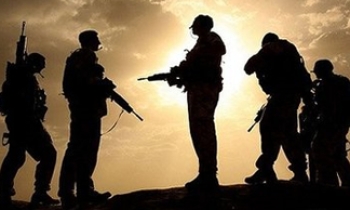Two prominent Somali radio journalists were killed in Mogadishu on Saturday, the first by gunmen in the morning and the second, the radio station's co-owner, in an explosion hours later as he returned from the reporter's funeral, according to news reports.
The killings targeted Horn Afrik radio, which has been criticised by the Ethiopian-backed Somali government as well as hardline members of an insurgency that has been battling government and Ethiopian forces for months, the Washiongton Post reported.

In the first attack, host of the popular talkshow 'Hello Hello' Mahad Ahmed Elmi was shot four times in the head at close range as he neared the door of his office at 7:15 am, colleagues said.
"We were outside when four gunmen jumped out," said one colleague, too terrified to reveal his name to Reuters. "They fired four shots against Mahad's head ... then they just fled," he said at the hospital where Elmi's body lay.
Later, the founder and co-owner of HornAfrik — Ali Iman Sharmarke — died when his four-wheel drive hit an explosive device in the road on his way back from Elmi's funeral.
Reuters journalist Sahal Abdulle, next to Sharmarke at the time of the blast, was lightly injured in the head and face. "We heard a huge, huge explosion. There was smoke everywhere. Ali was in the front, I was sitting right behind him," Abdulle said of Sharmarke, who had just brought his wife and children from Canada to Kenya to be nearer to him.
"This wave of killing and injuring media people is an intentionally organised mission to silence journalistic voices in Somalia," the National Union of Somali Journalists (NUSOJ) said. "We are entirely appalled by these acts."
“The transitional government must take urgent steps to protect journalists and thoroughly investigate and punish these murders to prevent further killings,” Reporters sans Frontières (RSF) said. “Somalia is already this year the most deadly country in Africa for the media. The two journalists seem to have been victims of a wave of violence in the capital in the past 24 hours. We present our condolences to their families.”

“These savage killings are an indicator of the perilous conditions facing journalists in Somalia, where political chaos and lawlessness threatens all independent journalism,” said Aidan White, International Federation of Journalists (IFJ) General Secretary. “It’s time for the international community to focus again on the crisis in Somalia. So long as journalists are targeted no one is safe.”
Another journalist, Abdihakin Omar Jimale of Radio Mogadishu, was wounded in a gun attack on Friday, the union said. The bullet had struck him in the shoulder.
Mogadishu, one of the world's most violent cities along with Baghdad, is wracked by an Islamist-led insurgency against the Somali government and its Ethiopian military backers. After a decade and a half of chaos under the rule of warlords, an Islamic movement took control of much of Somalia in June 2006, a Washington Post report recollected. In December, Ethiopia invaded the country to oust the Islamic movement, whose fighters now form part of the insurgency. Ethiopia, closely allied with the United States, supports the unpopular Somali government.
One of the biggest private media houses in Somalia, HornAfrik was criticised both by the Islamists during their six-month rule of Mogadishu last year, and then by the government since taking over the city at the New Year.
In a nation where only a few foreign journalists dare enter, and local reporters run daily risks of violence and harassment, HornAfrik is one of the main voices on Somalia to the world. Horn Afrik, founded in 1999, is considered the first independent radio station in the country. Though its staff is mostly drawn from Mogadishu's dominant Hawiye clan, which tends to oppose the government, it has often aired stories critical of Hawiye leaders, the Washington Post said.
It was shelled heavily in April, apparently from Ethiopian troop positions, prompting Sharmarke at the time to make a formal complaint to the government. Just hours before his death, Sharmarke had expressed sadness and anger at the murder of his employee Elmi.

"It demonstrates the conditions that Somali reporters are working under," the media businessman told Reuters just before the funeral. "The perpetrators want to silence our voices in order to commit their crimes."
Political, social and economic life in Somalia had been marred with intermittent civil war from the inception of the country in 1960 and attempts in recent years to unite the country’s warring clans and factions have failed. IFJ says that 19 journalist have been killed since 2000 when the country’s National Transitional Government was created.
The deepening safety crisis prompted action by the International News Safety Institute (INSI), which last week organised a training session in country for Somali journalists which was supported by NUSOJ in cooperation with another journalists’ group the Somaliland Journalists' Association. “In this divided country it is vital that the community of journalists is united against violence and intimidation,” said White.









